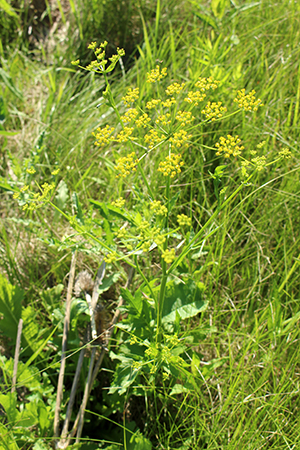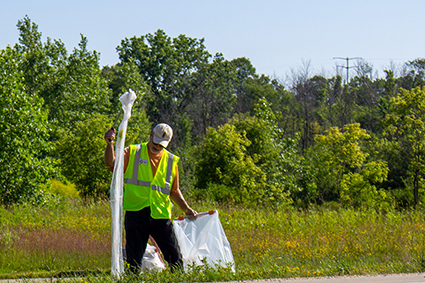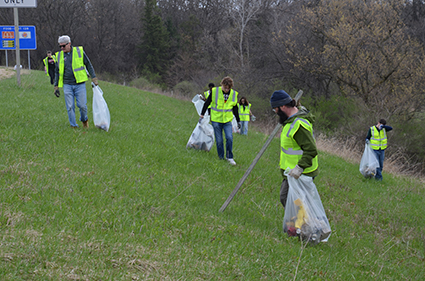Highway maintenance |
Roadsides |
Adopt-A-Highway |
Safety |
Clean-up Hazards |
Apply for a segment |
Report a clean-up |
Abandon a segment |
Contacts
Hazardous materials |
Outdoor hazards
Beware of Wild Parsnip
Wild parsnip is an invasive plant often found on roadsides. The sap from the plant can cause phytophotodermatitis, a serious rash on your skin. If the sap contacts your skin and is exposed to sunlight, a skin rash will result 24 to 48 hours later. The symptoms range from slightly reddened skin to large blisters and may feel like a burn. Be familiar with this plant when working on roadsides.
Wisconsin Dept. of Natural Resources - Wild Parsnip identification
UW extension office - Wild Parsnip Education
Hazardous materials
Hazardous waste found along our highways can pose potential dangers for Adopt-A-Highway volunteers. Do not pick up any of the following:
- Abandoned barrels
- Antifreeze
- Any container with a RADIOACTIVE label
- Any container with liquid including soda bottles
- Broken automotive batteries
- Bulging or dented containers
- Chemical containers
- Containers leaking an unknown substance
- Containers of unidentifiable materials
- Dead animals
- Gas cans
- Hypodermic needles
- Narcotics
- Paint cans
- Pesticide/herbicide containers
- Sharp objects
- Unidentifiable containers
- Used oil
- Weapons

If you see any of the items listed above:
- Always approach a container from uphill and upwind. The wind will blow any vapors away from you and approaching from uphill will prevent you from walking into any chemical present on the ground.
- Leave the area immediately if you detect any odors out of the ordinary. Be on alert for the following odors, these can be connected with meth lab waste as well as other chemicals:
- Ether-like
- Solvent-like
- Vinegar-like
- Ammonia-like
- Use common sense. If an item seems questionable, err on the side of caution and DO NOT TOUCH IT OR PICK IT UP. Put your safety, and the safety of the individuals with you, FIRST AND FOREMOST.
- Any items left behind, items on the pavement, and dead animals should be reported to the Adopt-A-Highway Coordinator on the cleanup report. County crews will come out and remove these items.
- If you find drugs, medical waste, or weapons, your crew chief should call 911. The proper authorities will come out and clean them up.
Meth lab waste
Meth is short for Methamphetamine. Methamphetamine drug lab waste can be found in many shapes and forms. Over 300 different chemicals can be used in production of the drug depending on the procedure used. The waste can be disposed of in many different ways, but one of the most common illegal ways is dumping the lab waste and propane cylinders on our roadsides.
- Meth lab waste could be medicine boxes, pill residue (putty looking substance pink to red in color), respirator masks, rubber gloves, rubber hosing and clamps, Pyrex glass, corning containers and other containers with rubber hoses attached. Bed sheets or pillow cases stained red or containing a white powdery residue may also be found.
- Propane cylinders from grills are used to transport anhydrous ammonia. This ammonia can burn your skin and cause very severe respiratory damage. These tanks, when used with the brass fitting, can explode when moved. The ammonia degrades the brass to the point where it can blow the fitting out of the tank, endangering individuals in the area. The brass fittings on the tanks will turn a blue to blue green color. Some tanks have been modified with other fittings. If you find cylinders, DO NOT TOUCH THEM but note location and report it to local law enforcement.
For further explanation of meth labs, watch this video courtesy of Colorado Department of Transportation:
Meth Lab Waste Recognition.
Abandoned barrels
If a lid on a drum is expanded outwards, this might indicate a good possibility of pressure inside container. There is a danger of exploding if this container were moved or touched. Other types of containers may also be found, and if you are unsure whether a container is safe to handle, DO NOT TOUCH IT!
Bottles or containers with liquid
Do not pick up bottles of liquid unless the liquid is clear. Liquids many not be what they appear to be. A bottle that looks like cola could contain a harmful substance.
Dead animals
Do not pick up dead animals. Dead animals can carry disease and should not be touched. If the animal is small, leave it for scavengers. If it is large, note the location and report it to the Adopt-A-Highway Coordinator.
Outdoor hazards

Working on roadsides can present many natural hazards one may not be familiar with. This is a list of items an Adopt-A-Highway volunteer should be familiar with and prepared to deal with:
- Fast moving traffic
- Heat stress
- UV radiation
- Severe weather
- Snakes
- Stinging insects and ticks
- Poison ivy and poison sumac
- Wild parsnip
Resources